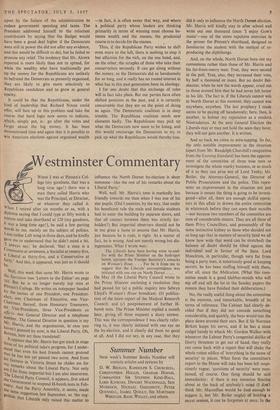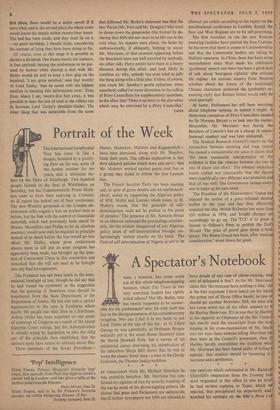Westminster Commentary
was rather Left wing in those days, and he kindly gave me to understand that he didn't mind a bit. 1 always say,' he declared, `that a man is a Communist at seventeen, a Socialist at twenty-five, a Liberal at thirty-five, and a Conservative at forty.' And this, it appeared, was just as it should be.
Well, this week that same Mr. Harris wrote to the Spectator (see `Letters to the Editor' on page 16). But he is no longer merely top man at Pitman's College. He writes on notepaper headed hY the names of one President, one President- elect, one Chairman of Executive, one Vice- Chairman thereof, three Honorary Treasurers, six Vice-Presidents, three Vice-Presidents ex Officio. one General Director and a telephone number. The General Director in question is my Mr. Harris, and the organisation, in case you haven't guessed by now, is the Liberal Party. Oh, "(Mi, how art thou translated! It appears that Mr. Harris has got stuck in stage three of his political rake's progress, for I under- stand that even his best friends cannot pretend that he has not yet passed two score. And from his fastness in Victoria Street he chides me for till Y remarks about the Liberal Party. Not only _In I far from impartial but I am also inaccurate. . Liberal Party Council, it appears, first asked the Government to suspend H-bomb tests in Feb- .`LuearY. And the Party Assembly, it seems, made "nsame suggestion last September, so `the sug- gestion Ion that Liberals only raised this matter to influence the North Dorset by-election is sheer nonsense—like the rest of his remarks about the Liberal Party.'
Well, well. Mr. Harris's tone is markedly less friendly towards me than when I was one of his star pupils. (Did I mention, by the way, that under his beneficent rule the male and female students had to enter the building by separate doors, and that all contact between them was strictly for- bidden?) But impartial observers should not be in too great a haste to assume that Mr. Harris, just because he is rude, is right. As a matter of fact, he is wrong. And not merely wrong but dis- ingenuous. What I wrote was : • The Liberals have been having some to-and- fro with the Prime MiniSter on the hydrogen bomb, apropos the Foreign Secretary's remarks on Woman's Hour. . . . Far be it from me to suggest that the Liberals' correspondence was initiated with one eye on North Dorset . . .
On May 18 the Liberal Party Council wrote to the Prime Minister enclosing a resolution they had passed for (a) a public inquiry into Selwyn Lloyd's Woman's Hour broadcast; (b) publica- tion of the latest report of the Medical Research Council; and (c) postponement of further H- bomb tests. The Prime Minister replied a month later, giving all three requests a dusty answer. This was the correspondence I was clearly refer- ring to, it was clearly initiated with one eye on the by-election, and it clearly did them no good at all. And I did not say, in any case, that they did it only to influence the North Dorset election. Mr. Harris will kindly stay in after school and write out one thousand times 'I enjoy Gow's music'—one of the more repulsive exercises in the primer for Pitman's shorthand, designed to familiarise the student with the method of re- producing the diphthongs.
And, on the whole, North Dorset bore out my contentions rather than those of Mr. Harris and his far-from-merry men. True, they were second in the poll. True, also, they increased their vote, by half a thousand or more. But no doubt Bel- shazzar, when he saw the words appear, cried out to those around him that he had never felt better in his life. The fact is, if the Liberals cannot win in North Dorset at this moment, they cannot win anywhere, anywhen. The last prophecy I made seems to be paying off handsomely; here, then, is another, to bolster my reputation as a modern Nostradamus. At the next General Election the Liberals may or may not hold the seats they have; they will not gain another. It is written.
And so back we come to wire-tapping. So far, the only notable improvement in the situation (apart from Mr. Randolph Churchill's resignation from the Evening Standard) has been the appoint- ment of the committee of three wise men to investigate the whole murky business, or as much of it as they can prise out of Lord Tenby, Mr. Butler, the Attorney-General, the Director of Public Prosecutions and the police. This repre- sents an improvement in the situation not just because it means the thing is going to be investi- gated—after all, there are enough skilful opera- tors in this affair to drown the entire committee in whitewash before they can open their mouths —nor because two members of the committee are men of considerable stature. They are all three of them Privy Councillors, and presumably of the same instinctive kidney as those who decided not so long ago that in matters of security (and we all know how wide that word can be stretched) the balance of doubt should be tilted against the individual and in favour of the State. Lord Monckton, in particular, though very far from being a party man, is notoriously good at keeping secrets; he has been stuffing himself with them, after all, since the Abdication. (What this com- mittee needs is a good blabber-mouth who will nip off and sell the lot to the Sunday papers the minute they have finished their deliberations.) No, the really useful thing about the committee is the extreme, and remarkable, breadth of its terms of reference. The Cabinet had clearly de- cided that if they did not concede something considerable, and quickly, the boys would tear the place down around their ears. But if Sir Norman Birkett keeps his nerve, and if he has a stout cudgel handy to whack Mr. Gordon Walker with whenever the Labour Party's congenital dislike of liberty threatens to get out of hand, they really can come back with a report that will shake the whole rotten edifice of 'everything in the name of security' to pieces. What form the committee's report to the House will take has been left suspi- ciously vague; 'questions of security' were men- tioned, of course. One thing should be said immediately : if there is any intention floating about at the back of anybody's mind (I don't think Mr. Macmillan would be fool enough to suggest it, but Mr. Butler might) of holding a secret session, it can be forgotten at once. In the first place, there would be a major revolt if it were tried, and in the second place the whole town would know the details within twenty-four hours. The bed has been made, and they must lie on it —no great hardship, I should think, considering the amount of lying they have been doing so far.
Of course, even at this stage it is possible to declare a dividend. One lesson learnt, for instance, is that anybody having the misfortune to be pur- sued by wolves while sharing a sled with Mr. Butler would do well to keep a firm grip on the handrail. '1 am quite satisfied,' said that worthy of Lord Tenby, 'that he acted with the highest motives in handing this information over.' Even from where I sat, twenty-five feet away, it was possible to hear the hiss of steel as the stiletto ran in between Lord Tenby's shoulder-blades. The other thing that was noticeable from the scene that followed Mr. Butler's statement was that the two Tories (Mr. Fort and Mr. Doughty) who tried to damp down the gunpowder (the former by de- claring that MPs did not want to be left out in the cold when the tappers were about, the latter by enthusiastically, if obliquely, helping to smear Mr. Marrinan, at that moment appearing before the Benchers) were not well received by anybody, on either side. Party points have been at a heavy discount during this affair, and look likely to continue so; why, nobody has even tried to jolly the thing along with a little joke. Unless, of course, you count Mr. Speaker's gentle aphorism, when somebody called for more discretion in the calling of Privy Councillors for supplementary questions, to the effect that 'There is no limit to the discretion which may be exercised by a Privy Councillor.'
TAPER















































 Previous page
Previous page